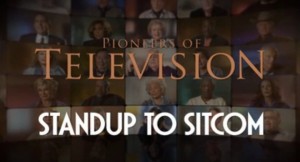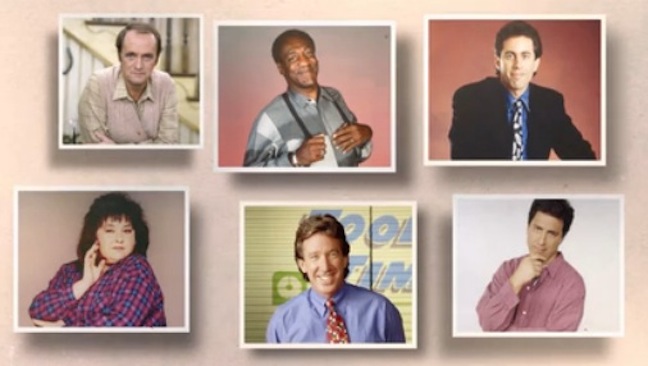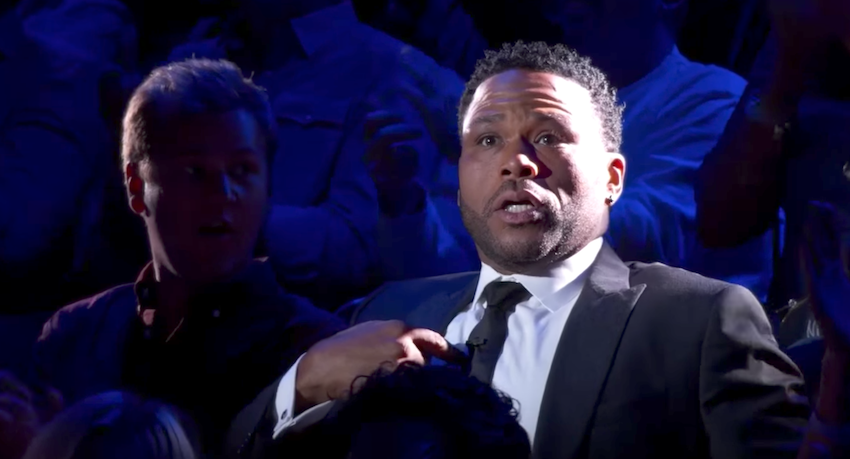“In the beginning of stand-up, it’s the hardest thing in the world, because you are not good,” said Ray Romano.
“It takes 30 years to make a good, a great stand-up comic,” Roseanne said. “And it does!”
And yet it doesn’t take quite that long to get the attention of network TV executives, particularly if you delivered just the right, unique performance in late-night TV on The Tonight Show with Johnny Carson, or later, Late Show with David Letterman. That was certainly the case for both Romano and Roseanne. They — along with Jerry Seinfeld, Tim Allen, Bob Newhart and Bill Cosby sat down to talk about their paths from “Standup to Sitcom” in the latest episode of Pioneers of Television, which premieres tonight on PBS.
Although the hourlong documentary traces the roots of stand-up sitcoms back to the team of George Burns and Gracie Allen, and The Jack Benny Show, too — it’s really focused more on a walk down TV memory lane for the 10 years from the mid-1980s through the mid-1990s, when Cosby reinvigorated the network sitcom and launched what seemed like a thousand (but in reality was closer to 100) pilots and series that revolved around the onstage personas of stand-up comedians.
Seinfeld is the classic example.
As he once more tells the story of earning a meeting with NBC executives following his great experiences on The Tonight Show, Seinfeld has another chance to clarify that whole “show about nothing” legendary pitch. It didn’t quite go down like that. Rather:
“They called me in and they said, ‘What is it that you have in mind?’ And I said, ‘Nothing.’ I don’t have any — I didn’t have anything in mind. I actually believed maybe they had something in mind. Since they had the big building with the logo on it, I thought maybe, that’s what they do here. Maybe they come up with TV shows and they take talented people and say, ‘We have a show for you.’ But they don’t do that. They don’t do that.”
Fortunately for Seinfeld, he already had a friend and willing comedy partner in Larry David, and as they walked and talked — in and out of cars, before and after coffee — these two comedians came up with the idea for the hit sitcom, Seinfeld.

Of course, part of the legend of Seinfeld is that, as The Seinfeld Chronicles, it almost tanked and died an early death after its first season on NBC.
Across the dial, meanwhile, Tim Allen reigned with Home Improvement as the number-one show on TV. Allen recalled turning down two sitcom offers from Jeffrey Katzenberg (then head of Disney) in 1990. “I had had a career touring. I was making great money. And really doing what I wanted to do. So I didn’t need the gig. So when Jeffrey called and said, ‘We want to offer you this,’ and I said, ‘Well, I don’t think so,'” Allen said. That, and Allen wanted to pitch his own show.
Several of the stand-up comedians mention hearing the studios bring up acting school or classes. Can you play well with others onstage when you’re known as a solo act? But really, as Allen pointed out, the question is even more basic and procedural than that. “They wanted to know can you memorize?” After all, a weekly sitcom tapes on a schedule, and with a new 40-page script each week to burn into memory to deliver, in all of the classic cases, before a live studio audience.
In Allen’s case, he noted that his post-sitcom roles didn’t demand too much more of him than being the Tim Allen viewers had come to know and love. “You get paid to be a certain guy,” he said. “They don’t want to see me being Othello.”
For Roseanne, she recalled extra obstacles and issues, as she ran up against Ivy League writers rooms in trying to convey the class and gender issues that ended up making her sitcom a hit.
Romano got the call for a sitcom deal from Letterman’s Worldwide Pants production shingle, after performing on Letterman’s show. What would become Everybody Loves Raymond, however, Romano credits Phil Rosenthal for making the parents a vital piece of the puzzle. If not for that, maybe his show wouldn’t have taken off quite like it did. And then maybe Romano wouldn’t be in this documentary, he laughs. “Maybe you’re talking to George Lopez for an hour. And that’s not a bad thing.”
Newhart starred in two sitcoms — The Bob Newhart Show and Newhart — and said the onscreen version of Newhart was about 85 percent his true self, and the other 15 percent resulted from “a sick mind” of the TV writers.
And then there was Cos.
The Cosby Show‘s arrival in September 1984 not only revitalized the TV sitcom and paved the way for so many development deals for stand-up comedians, it also provided the building block for what a generation knew as Must See TV.
There’s not much here in this hour about why the TV networks looked to so many stand-up comedians after these “pioneers,” nor much, really, in-depth about the process of transforming a comedian’s one-hour act into 100 half-hour episodes. And as the interviews do point out, for many of these stand-ups, the path isn’t just “Standup to Sitcom” but also back to stand-up afterward. They almost always go back to the stage and the clubs and the lone microphone.
But for lovers of comedy and these comedians in particular, it’s a comforting look back at a time when stand-ups ruled sitcoms.
Pioneers of Television: “Standup to Sitcom,” premieres tonight on PBS. Check your local listings.


